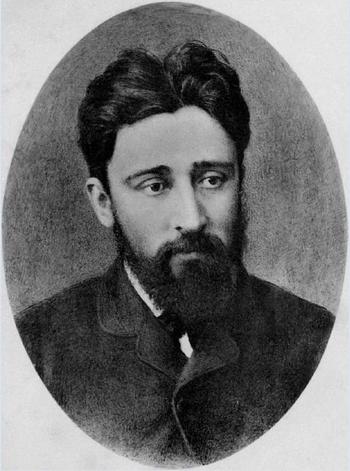Vsevolod Mikhailovich Garshin was born in what is now Ukraine in 1855. His troubled childhood was epitomised by his mother's abandonment and father's subsequent suicide, an event which occurred when he was aged 8 and to which he bore witness. Already acquainted with death, Garshin would serve in the Russo–Turkish War. While fighting in Bulgaria he suffered a near-fatal injury; this event would inspire his short story ‘Four Days’, which features the thought process of a wounded soldier who spends a 4-day period ‘face to face’ with the corpse of the enemy soldier he had shot.
He found publication and positive reception for his first short stories, yet he was beset by ‘periodical bouts of mental illness’, for which he was committed to an asylum in 1872 and in 1880. Ilya Vinitsky's Madness and the Mad in Russian Culture says that: ‘Garshin probably suffered from bipolar disorder’. Garshin's bipolar episodes frequently rendered him incapable of writing; but on recovering his energy he would pick up the pen and carve out more brooding tales, exploring subjects such as the homecoming of a crippled warrior.

Furthermore, Garshin extended Russia's tradition of ‘lunatic-asylum’ tales with ‘The Red Flower’, which features a psychotic protagonist who has taken it upon himself to vanquish the world's evil; this colossal evil is concentrated within a certain flower blooming triumphantly in the courtyard garden of the narrator's mental hospital. Driven by the eternal significance of his task, the delusional in-patient devotes every last bit of his energy to outsmarting the highly vigilant warders and confiscating that towering flower of evil. He succeeds in his task, only to die soon after of ‘nervous exhaustion’.
In 1888, at the age of 33, Garshin exited his fifth-floor St Petersburg room and threw himself down the building's stairwell. Gravely injured, he languished in a semi-conscious state, expiring after 5 days at a Red Cross hospital.
Though his name is less known, certain elements of Garshin's work have been linked to those of the ubiquitous Russian masters; his solemn compassion for mangled bodies and shattered hearts has been compared to Dostoevsky, and his description of grim venues to Chekhov. Indeed Garshin's short and embattled life was not conducive to vast literary output; his complete works comprise some 20 tales and are easily contained within a single volume. Of Garshin's existence and suicide, the legendary Chekhov said: ‘An unendurable life! But a stairway, that is terrible. I saw it – dark, dirty’.





eLetters
No eLetters have been published for this article.